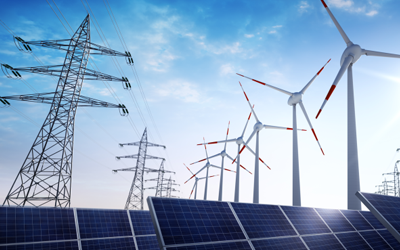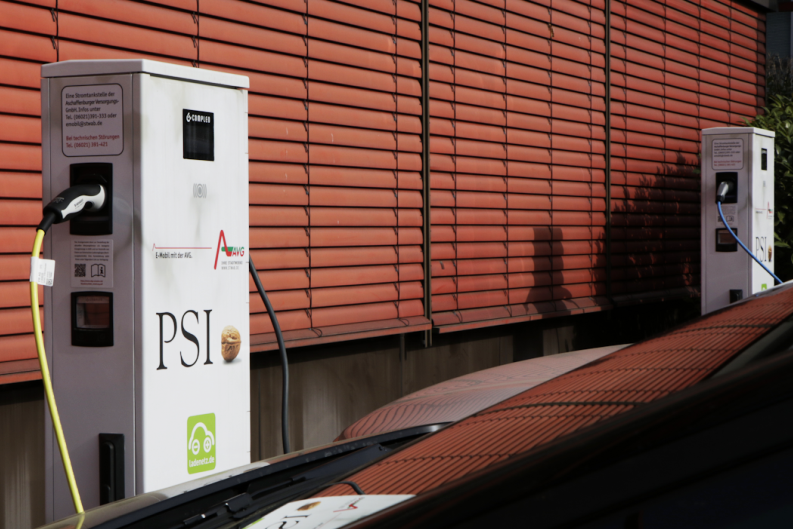
Sustainability Environment & Products
The focus is on the responsible use of energy, raw materials and labor in the energy, production and transport sectors.
We minimize our ecological footprint.
Environmental Policy
Although PSI as a software manufacturer only has a negligible impact on the environment, the group relies on sustainable and resource-saving technologies in its own business processes. PSI uses green IT equipment for its own infrastructure in order to save energy and resources. The cloud provider used internally and in customer projects by PSI has committed itself to reducing its greenhouse gas emissions by 65 % by 2025 and to zero by 2030.
In Germany, PSI procures electricity exclusively from renewable sources and relies on combined heat and power at the Aschaffenburg location. At the Aschaffenburg site, PSI has also purchased charging stations that are operated by the regional supplier AVG and used to charge electric company cars and private e-vehicles.
In 2020 PSI carried out an energy audit in accordance with DIN EN 16247 in order to evaluate energy flows and potential for improvement in the area of energy efficiency. PSI has been participating in the Carbon Disclosure Project (CDP) since 2011 and and achieved a Climate Change Score B- and Supplier Engagement Rating B in 2022.
In 2021, the user forum for the public transport business segment was held for the first time as a sustainable event in the Berlin Environment Forum. The environmental forum is the official Sustainable Event Partner of the city of Berlin.

Ladesäulen
At the Aschaffenburg site, PSI has purchased charging stations that are operated by the regional supplier AVG and used for charging electric company cars and private e-vehicles.
Environmental Management System
As PSI as a service provider does not produce physical goods, PSI's business processes only have a marginal effect on environment and resources. Nevertheless, all employees are called upon to use natural resources carefully, to separate waste and recyclable materials and to comply with the requirements of DIN EN ISO 14001. The use of natural resources at PSI is essentially limited to:
- Use of consumables in the office (paper, toner, etc.)
- Use of energy (electricity, heating) and water in the office buildings
- Use of transport during travel (see travel expenses directive)
The implementation of environmental management is currently being demonstrated by external energy audits and the participation in the Carbon Disclosure Project. In January 2024, the first PSI site was certified in accordance with DIN EN ISO 14001. The certification of further sites is planned and should take place from the second half of 2024.
Products and Services
For 50 years, PSI has been helping customers in the energy industry and in energy-intensive industries by providing software solutions to increase efficiency and use energy, raw materials and labor responsibly. PSI products thus have a relevant influence on the sustainability of business processes in the industries supported.
PSI control systems for electrical grids
PSI’s control systems for managing major electricity grid have been and are being continuously expanded to include functions for the intelligent management of the feed-in of renewable energy, which allows significantly more energy from renewable sources to be used, minimizes losses in the grid and also increases the security of supply. Together with partners from the energy industry and academia, PSI is actively involved in developing the intelligent energy supply infrastructure of the future. This includes products for virtual power plants, smart microgrids and the integration of charging infrastructure for electric vehicles into the existing electricity grids. A self-learning network autopilot is available for large transmission and distribution networks, through which a higher proportion of renewable energy can be integrated into existing networks. Overall, up to 50 % more renewable energy can be transported through intelligently managed networks.
Gas management systems for optimizing network operation
PSI’s gas management systems optimize the transfer, distribution and storage of natural gas, green gas and hydrogen. They optimize the compressor stations required for grid operation and minimize technical losses. Leak detection and location systems help reduce losses when transporting gas and fuels over long distances and avoid environmental damage. By integrating higher proportions of hydrogen into the existing gas grid in order to store surplus wind power as "green hydrogen", PSI systems make a positive contribution to the energy transition.
Optimization software for saving resources
When maintaining electrical networks and other critical infrastructures, business processes can be improved with PSI's own optimization software so that the same workload can be managed with up to 15 % less use of resources and fewer CO2 emissions. By avoiding unnecessary load peaks, employee satisfaction improves at the same time.
Solutions for the dynamic control of logistics networks
In the field of logistics and transport, PSI has in recent years developed new solutions for dynamic control of optimized logistics networks that help reduce transport costs and emissions by up to 10 %. Further functions include energy optimized driving in rail transport and a depot and charging management system to optimize the dispatch of zero-emission buses.The first depot managed with PSI software, which was built specifically for electric buses, saves around 2,500 tons of CO2 per year. In the meantime, PSI's decision-making optimization is helping more than 15 transport companies to reduce greenhouse gases and save energy.
Optimization in the automotive industry using PSI sequence optimization
When optimizing the assembly sequences in the automotive industry using PSI sequence optimization, an average of 15 % of resources can be saved, which corresponds to an annual CO2 avoidance of several thousand tons for a vehicle factory. In the steel and aluminum industry, PSI's AI algorithms optimize the use of energy and resources, and they also accompany the structural change to low-carbon steel production. The share of energy reuse in downstream process steps in an integrated steelworks could be increased from 5 % to 54 % through better planning, which resulted in energy savings of more than 20 %. Higher productivity and energy reuse are a major contribution to sustainability, as the steel industry produces 7 % of the world's CO2 emissions.
PSI is not involved in adult entertainment products, alcohol products, controversial weapons, firearms, fur and special leather production, gambling products or services, genetically modified organisms, military contracting, nuclear power generation, nuclear power related services, pesticides and tobacco products. Since PSI manufactures intangible goods, PSI's business also has no influence on protected or biodiversity-sensitive areas. Further information in the Annual Report 2023.
Environmental awareness pays off
At the German Mobility Awards, the PSIroads MDS product was recognised as a beacon project for intelligent mobility in 2017. The LINDA research project, in which PSI and its partners developed a concept for the emergency power supply with renewable energies in the event of a blackout, was awarded the Bavarian Energy Prize in 2018 and in 2019 with the ISGAN Award of the International Smart Grid Action Network.
As in previous years, PSI was again awarded the DZ Bank Seal of Quality for Sustainability in 2023. The Financial Times included PSI as one of only 25 technology companies in the list of the leading European companies in climate protection "Europe Climate Leaders 2022". The magazine Focus Money again rated PSI 2021 for the third time in a row as one of the most valuable German companies in terms of environmental, economic and social responsibility in 2020. In a study conducted by the Capital magazine in December 2020 looking into Germany’s most climate-conscious companies, PSI ranked 8th out of 2,000 companies. The news magazine FOCUS and the research institute FactField recognized PSI as one of the German companies with top climate commitment for the third time in a row as part of an extensive study in 2023.
